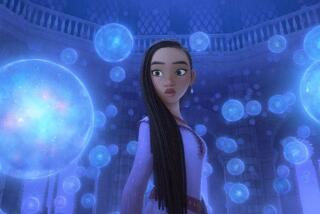The trick for ‘Tuck’: Appeal to kids and parents
- Share via
With “My Dog Skip” and his new Disney film, “Tuck Everlasting,” Jay Russell has gained a reputation as a director who makes family films with substance -- and even something of an edge. Both films deal with such dark subjects as aging, death and loss of innocence. In fact, like “Peter Pan” and “The Black Stallion,” they are just as much for adults as children.
“Adults are members of the family too,” says the 42-year-old Russell. “I remember when I was growing up and went to the movies with my family, my parents would enjoy them just like I would. I think there is room for a film that doesn’t patronize kids. I think kids like to be challenged.”
The mixture of adult and children’s sensibilities worked for the low-budget “Skip,” a modest hit in 2000 that took in $34.1 million at the box office. “Tuck,” which opened Friday to extremely positive early reviews, is aimed at teenage girls, although Disney also hopes to pull in young women and parents.
Russell remembers sitting in the back of the theaters for previews for “Skip” and “Tuck” and breaking out into a cold sweat. “I would think, [children] are not going to sit through this; it is too quiet. It is too deliberately paced. And then in both cases I was just pleased to have it pleasantly confirmed that they will sit through these movies. One of the greatest thrills after the first preview of ‘Tuck’ was following the kids into the lobby after the film and seeing them debating the movie.”
Based on the award-winning novel by Natalie Babbitt, “Tuck Everlasting” is a magical fable about a teenage girl, Winnie (Alexis Bledel), who longs to escape the grip of her demanding mother (Amy Irving) and father (Victor Garber). One day she gets lost in the woods near her home and is found by Jesse Tuck (Jonathan Jackson), a joyous young man who lives with his family (William Hurt, Sissy Spacek and Scott Bairstow). But they all share a powerful secret -- they have drunk from a magical stream that has given them eternal life. The enigmatic Man in the Yellow Suit (Ben Kingsley) knows of their secret and wants access to the water.
“The goal is for the film to work on multiple levels,” says Russell. “I think that’s why the ‘Toy Story’ movies work so well, because adults and children are getting both the same and different things out of them.”
“It’s an amazing thing,” says the film’s co-star, Jackson. “It gives people, especially young people, a safe environment to talk about this stuff. A lot of the other entertainment is extremely graphic, or if it’s the news it is incredibly intense. I think it would be hard for young people to talk about [death].”
Issues of life and death
Producer Jane Startz notes that the book “is a very, very philosophical story that deals with the essentials -- choosing between life and death and what does it mean to lead a full life. A person’s life is a sum of all of their parts, and part of that is being young and part of that is being not so young.”
Screenwriter Jeffrey Lieber, who wrote the first four drafts of the script, says because the book was “stuck right there between a kids’ book and an adult book, I was always riding the line as to which way to go. My instincts are always to pull it older, and at times Jane had to pull me back and remind me the core audience is 13 to 19 years of age. As an adult you look at the themes and you connect to them so strongly. Kids want to grow up, but adults see their past behind them.”
Screenwriter James V. Hart, who did the final version of the script (he shares credit with Lieber), hopes adults see the movie. “That’s the problem with a movie like this, where they are targeting a specific audience,” he says. “When I did ‘Hook’ [Steven Spielberg’s take on “Peter Pan”], adults didn’t discover that movie until video.”
Hart sees a lot of “Peter Pan” in “Tuck.” Though James Barrie wrote “Peter Pan” as a children’s fairy play, Hart says, “it rests on extremely layered and complex psychological issues that come from being an adult. I guarantee there’s a point in the play where every adult cries and the kids don’t, and that’s when Wendy grows up and tells Peter she can’t fly. That’s exactly the promise that Jesse Tuck is making to Winnie Foster -- he is offering her the chance to be Wendy.”
More to Read
Only good movies
Get the Indie Focus newsletter, Mark Olsen's weekly guide to the world of cinema.
You may occasionally receive promotional content from the Los Angeles Times.








